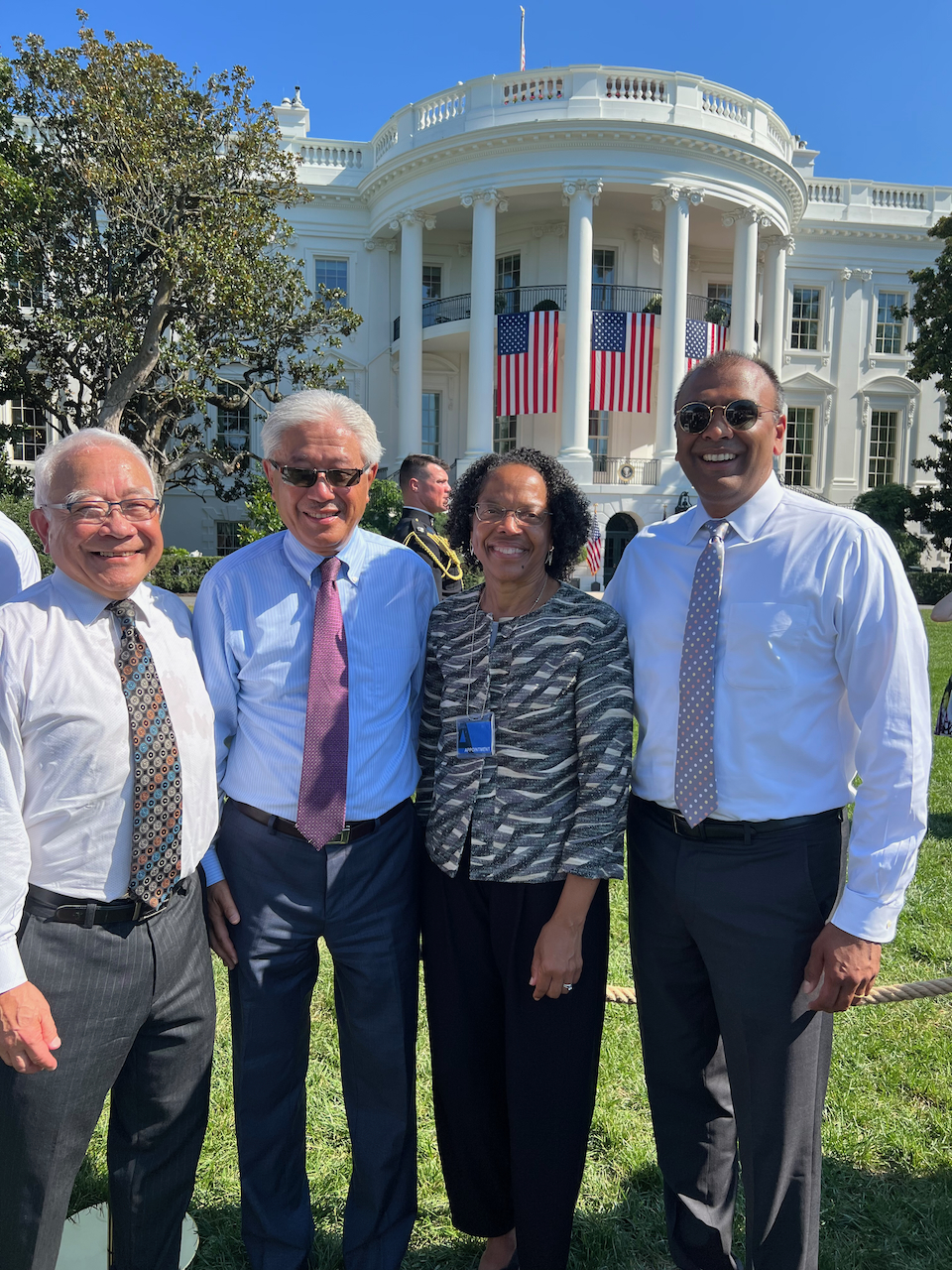The Office of Science Policy and Strategy leads efforts to anticipate the needs of an increasingly dynamic biomedical research endeavor and to position UCSF optimally, both by working within the University and by influencing science policy at the local, state, national, and international levels.

Keith R. Yamamoto, PhD, the inaugural vice chancellor for Science Policy and Strategy since 2015, is a leading voice for science policies that emphasize integration at three levels: 1) creating a continuum of basic, clinical and population research; 2) merging the concepts and approaches of physical sciences, engineering and computation/math with those of the life sciences; and 3) fostering effective partnerships between academia, industry, government, and other stakeholders. Yamamoto works closely with UCSF’s Government Relations team to advocate for the University and advance science policy goals in Sacramento and Washington D.C. (see below).
Also serving as UCSF’s Director of Precision Medicine, Yamamoto brings a special focus to advancing policies that enable the use of big data and advanced computing tools to equitably deliver more precise diagnostics, therapeutics, and prevention measures. Yamamoto, along with former Chancellor Sue Desmond-Hellman, played a key role in creating the 2011 report “Toward Precision Medicine – Building A Knowledge Network for Biomedical Research and a New Taxonomy of Disease,” which coined the term “precision medicine” and laid out the vision and roadmap to achieve its promise. These efforts helped shape President Obama’s Precision Medicine Initiative, announced at the 2015 State of the Union address, and UCSF’s Precision Medicine Program. Learn more below about some of the initiatives and organizations Science Policy and Strategy supports, which span precision medicine, transdisciplinary science and technology, open science, broad science policy and practice, science funding, and STEM education.
Local / Campus
UCSF Science Policy Group
SPG at UCSF serves as a platform for discussing science policy issues, providing resources, and training for science policy education, and initiating advocacy within and beyond UCSF.
Applying Science to Policymaking
This spring minicourse, developed in collaboration with the UCSF SPG and inspired by UC Riverside’s Science to Policy Program, focuses on teaching graduate student scientists two core competencies: (1) knowledge of the policymaking process and (2) rhetorical skills for communicating with a variety of audiences, with special attention given to how these skills can be used in advocacy and social justice work.
We are seeking synergies with related UCSF efforts, including the UCSF Clinical & Translational Science Institute’s Impacting Policy by Accelerating Translation (IMPACT) Program, which aims to influence real-world decision-makers to use data and science to inform their work by providing UCSF faculty and staff with resources and training in collaborating with a broad range of stakeholders to quicken the adoption of evidence-based policies in healthcare, government, industry, and other sectors.
State
California Initiative to Advance Precision Medicine
The California Initiative to Advance Precision Medicine (CIAPM) was launched in 2015 to support collaborative research and foster partnerships between the state, researchers, patients, communities, and industry to further the aims of this new approach to health and medicine. Yamamoto serves as the Vice Chair of the California Precision Medicine Advisory Council.
California Initiative for Regenerative Medicine
Accelerating world class science to deliver transformative regenerative medicine treatments in an equitable manner to a diverse California and world. Yamamoto serves as an Advisor to the CIRM. Yamamoto is an Independent Citizens Oversight Committee Member.
National
Advanced Research Projects Agency for Health (ARPA-H)
ARPA-H will support transformative high-risk, high-reward research to drive biomedical and health breakthroughs—ranging from molecular to societal—that would provide transformative solutions for all patients.
CHIPS and Science Act
The act includes a historic investment to surge production of American-made semiconductors, tackle supply chain vulnerabilities to make more goods in America, revitalize America’s scientific research and technological leadership, and strengthen America’s economic and national security at home and abroad.
(See article co-authored by Keith Yamamoto and Mary Woolley, Research!America: A stand-alone CHIPS bill helps China by limiting US innovation)
Coalition for Life Sciences
CLS is an alliance of professional organizations working together to foster public policies that advance basic biological research and its applications in medicine and other fields. Yamamoto serves as the Chair of the Board of Directors.
Engineering Biology Research Consortium
The Engineering Biology Research Consortium (EBRC) is a non-profit, public-private partnership dedicated to bringing together an inclusive community committed to advancing engineering biology to address national and global needs. Yamamoto is on the governing council and member of the Policy and International Engagement working group.
National Academies - Roundtable on Aligning Incentives for Open Science
A convening of critical stakeholders to discuss the effectiveness of current incentives for adopting open science practices, current barriers of all types, and ways to move forward to optimally align reward structures and institutional values. Yamamoto serves as the Co-Chair.
National Academies - Advancing Anti-Racism, Diversity, Equity, and Inclusion in STEM Organizations: A Consensus Study
An interdisciplinary committee of experts is developing a cohesive report with recommendations for actionable antiracist mechanisms to advance diversity, equity, and inclusion.
Rapid Science
Rapid Science aims to accelerate the pace and accuracy of scientific discovery through open and collaborative practices - Incentivizing Collaboration and Open Research (ICOR) operates under Rapid Science. Yamamoto serves as a strategist for Rapid Science.
Research!America
Research!America is a non-profit medical and health research advocacy alliance. Yamamoto serves on the board.
Science Technology Action Committee
STAC is a group of 22 non-profit, academic, foundation, and corporate leaders working to dramatically strengthen U.S. science and technology. Yamamoto is one of the co-chairs.
International
American Association for the Advancement of Science (AAAS)
AAAS, the world’s largest multidisciplinary scientific society, seeks to "advance science, engineering, and innovation throughout the world for the benefit of all people." Yamamoto is President-Elect as of April 2022 and will serve as President starting April 2023.
Public Library of Science (PLOS)
PLOS is a nonprofit, Open Access publisher empowering researchers to accelerate progress in science and medicine by leading a transformation in research communication. Yamamoto serves on the Board of Directors.
Radiation Effects Research Foundation
The principal focus of RERF’s research program is to study radiation effects in the survivors of the atomic bombings of Hiroshima and Nagasaki. Yamamoto serves on the Board of Councilors.
U.S.-China Science & Technology Working Group
The Working Group is organized by the Asia Society Center on U.S.-China Relations and the 21st Century China Center at the UC San Diego School of Global Policy and Strategy. Yamamoto is a member of the working group.
Speaker Nancy Pelosi Holds San Francisco Event on the CHIPS and Science Act: Vice Chancellor of Science Policy and Strategy, Keith Yamamoto, delivers remarks starting at 26:42.
